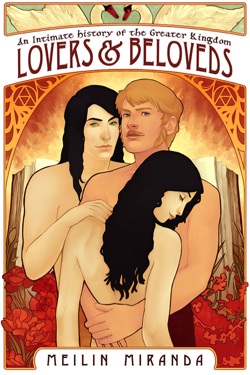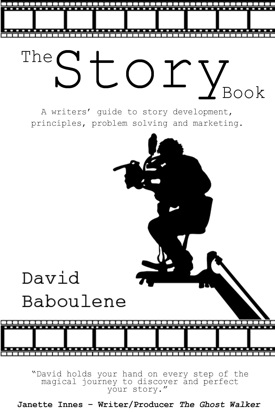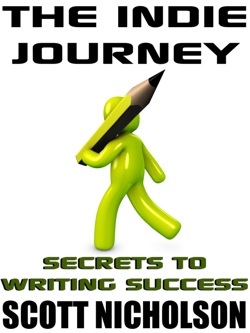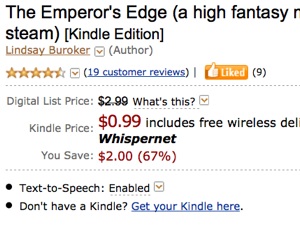 Today we’ve got an interview with indie fantasy author MeiLin Miranda. I tracked her down after reading a review of her novel, Lovers and Beloveds, over at Frida Fantastic. She started out publishing her work as a web serial and got help with the initial ebook start-up costs (for cover art, editing, etc.) from her fans. Read on for details….
Today we’ve got an interview with indie fantasy author MeiLin Miranda. I tracked her down after reading a review of her novel, Lovers and Beloveds, over at Frida Fantastic. She started out publishing her work as a web serial and got help with the initial ebook start-up costs (for cover art, editing, etc.) from her fans. Read on for details….
What led you down the road to independent publishing?
Frankly I didn’t know if I had time to do it the traditional way. I finally began my lifelong wish to write fiction after a 30-year career in nonfiction when I had a near-death experience five years ago. None of us know when we’re going to die, but that kicked me into high gear; I started writing. And while I’m a lot better now, when it came time to figure out what to do a couple of years ago I didn’t know if I had the years to find an agent, years to find a publisher, years to wait for the book to come out.
I started reading a webserial and thought, hey, maybe this is what I’ll do. I began writing my series, “An Intimate History of the Greater Kingdom,” as a serial. It quickly gained a large audience, and I never looked back. When it came time to make it into novels rather than a serial — it turned out to be unsustainable as a serial — going indie was a no-brainer.
I read in a review that your first novel, Lovers and Beloveds, was a crowd-funded project insofar as paying for editing and cover art went. How did that come about?
Yes. Forty-eight people bought pre-sale packages to the tune of $2500. That paid for my editor, artist and typographer, and then the purchase and shipping of the paperback for those that bought the print package. The $50 presale bought them an autographed paperback, the finished formatted ebook and a thank-you in the acknowledgments, but the real attraction was that they got the raw manuscript as soon as my editor and I decided it was done (the $25 package was everything but the paperback). I finished on August 31st, 2010 at 9:30 pm; the raw manuscript was in their hands 24 hours later.
It came about because I needed $500 to match $500 I’d saved up for my editor. So I put this package together and said, OK guys, match me. I had the $500 in 24 hours, I closed the presale, and a bunch of people complained that they didn’t get a chance to buy one. So I reopened it. I had the rest of the $1000 in less than 72 more hours.
After that I just kept it open so that everyone would have a chance. It stayed open until about two months before the book came out, at which point it switched to pre-orders of the book–regular-priced autographed paperbacks.
I see you have your novels priced at $4.99 in the Kindle store. That’s a higher price than many indies try, at least in the beginning. Does $4.99 work well for you? Have you tried other price points?
I was priced at $2.99 for a while and sales were okay. Reading other authors’ experiences, though, there seems to be a “sweet spot” for each book, and sometimes that spot is *higher* not lower. So as an experiment I raised the price to $4.99. I’m selling the exact same number of books as I did in March and April (the price went up in the middle of April)–in fact this month I’m on track to sell more. And I make a lot more money. This is a BIG book–140,000 words, 420 pages in a 6×9 trade paperback–and $5 is not a lot for that many hours of quality reading. In fact, just the other day I got $5 from someone who got the book for free and liked it so much she paid me for it. When book two comes out I will probably drop the price of book one for a while, or perhaps for good.
One could argue that your novel has a fairly niche target audience. Do you have any marketing tips for those who aren’t writing in the most popular genres?
Quite honestly, no. What has worked best for me is to figure out who I’m most like and then appeal to that audience. For me, apparently that’s Jacqueline Carey, who I’ve never read myself. I’m told that while our styles and stories are different, we’re mining similar veins. So I’ve started saying in my marketing “If you like Jacqueline Carey, you’ll like ‘Lovers and Beloveds.'” It seems to be working–it gets me many more acceptances on reviews, at least. I’m still trying to figure out how to find Carey fans, though! Her fan sites don’t take advertising.
You have some shorter ebooks (stand-alone short stories and collections of shorts) out there too. How do those sell for you?
On initial release very well, but then they taper off. I think they’re selling to the choir, so to speak. I don’t think I have my blurbs down yet, or they may just be limited to people who’ve read the book. I did my best to make them stand-alone; reviewers of “The Gratification Engine” say they can tell you’d get more out of it if you’d read the book but that it was enjoyable nonetheless.
Do you want to finish up by telling us more about your work and any future projects in the pipe?
I’ve just today put book two in the corner to let it think about what it’s done. 🙂 I lost my way, and I’m taking a break for a week or two on the order of my editor to let the thing settle. While I’m doing that I’m working on another related short that takes place not long after the story-in-story of “Lovers and Beloveds.”
And I’m writing some more episodes of my fantasy western webserial, “Scryer’s Gulch.” I put it aside to work on book two, and its readers are peeved–especially since its last page was an April Fool’s story written by another writer in a round-robin the webserial community did. The story’s title: “The End.” People think I’ve abandoned the story, even though that entry is marked APRIL FOOLS! Gotta get back to that.
You can read “Lovers and Beloveds” in installments free on my website at http://www.meilinmiranda.com/intimate-history, where you’ll also find links to buy the ebook at Amazon, B&N, Smashwords and direct from me.
You can read all of “Scryer’s Gulch” for free on my site as well, though there are also ebook collections of Gulch episodes for people like me who prefer to use their e-reader to reading on a computer. 🙂 You’ll find the beginning of “Scryer’s Gulch” at http://www.meilinmiranda.com/scryers-gulch-1


 Today we’ve got a guest post from UK author David Baboulene who’s here to talk about something dear to all of us: writing.
Today we’ve got a guest post from UK author David Baboulene who’s here to talk about something dear to all of us: writing.
 online conversations. “How can you find out if your ebook is up on a pirate site?” “How many sales am I losing because of pirated ebooks?” “What do I do if I find my ebook listed on a pirate service?” Things of that nature.
online conversations. “How can you find out if your ebook is up on a pirate site?” “How many sales am I losing because of pirated ebooks?” “What do I do if I find my ebook listed on a pirate service?” Things of that nature.



